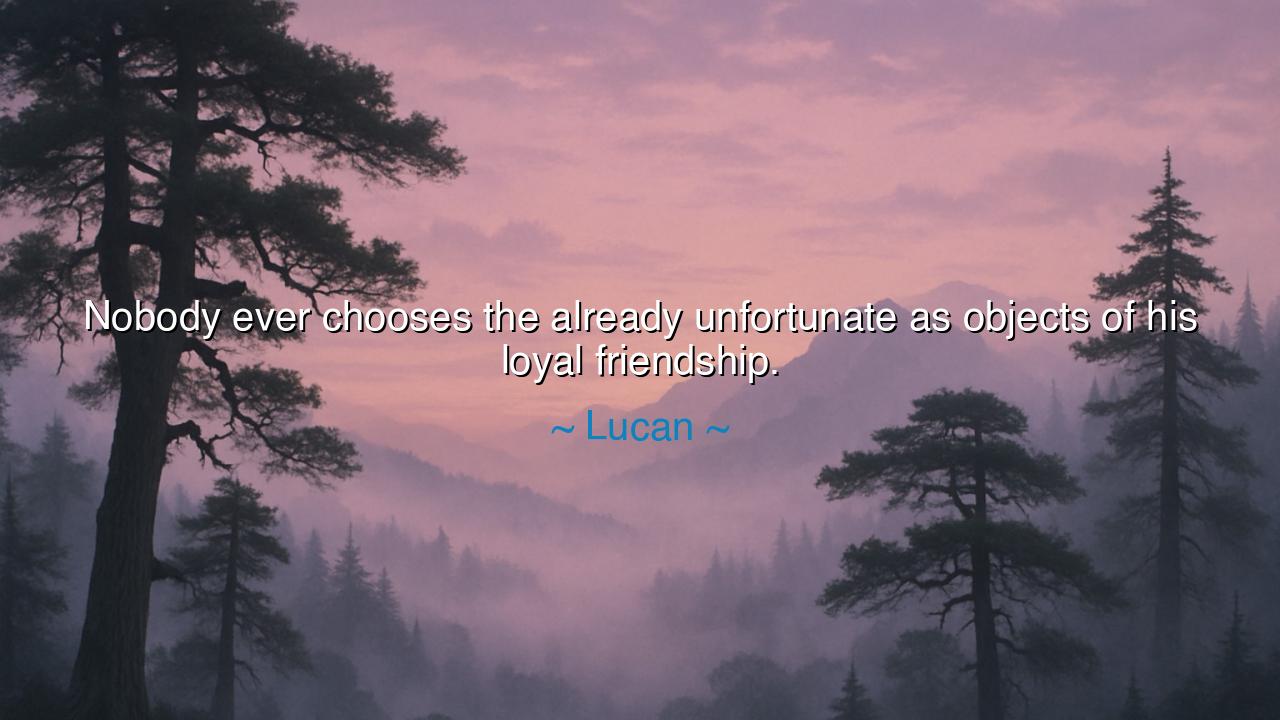
Nobody ever chooses the already unfortunate as objects of his






“Nobody ever chooses the already unfortunate as objects of his loyal friendship.” So spoke Lucan, the Roman poet whose verses were soaked with the blood and sorrow of his age. In this saying lies a cruel mirror held to human nature—a truth so piercing that few can bear its reflection. Lucan, who lived in the time of Nero, saw how swiftly fortune changes hands, how friendship bends beneath the weight of adversity. He knew that men gather around the flame of success like moths to light, but scatter into the night when the fire dies. His words do not merely describe an age—they condemn a weakness that still stains the hearts of men.
In this saying, Lucan unveils the fragile nature of loyalty. When a man stands tall in strength and glory, companions surround him. They praise his deeds, share his feasts, and drink from his cup of triumph. Yet, let him fall into misfortune, and those same lips fall silent. His house grows cold, and the door that once swung open to visitors now hangs untouched. True friendship, Lucan suggests, is rare because it demands courage—to love when the world withdraws its favor, to remain when all others flee. It is easy to honor the prosperous, but to stand beside the broken—that is the test of the soul.
Consider the fate of Cicero, Rome’s great orator. When his words stirred the Senate and his name echoed through the Forum, he was surrounded by allies who called him friend. But when the storm of politics turned against him, when his voice trembled before the shadow of Antony, how few remained. Those who once swore eternal loyalty now watched from afar as he was hunted and slain. His head and hands were nailed to the Rostra where he once spoke, and the city that had once cheered him turned away. Such is the loneliness of the unfortunate—the desertion that follows downfall is as sure as the setting of the sun.
Yet, not all hearts are faithless. Loyal friendship has appeared in rare, shining moments, as if to remind mankind of what is possible. In the tale of Damon and Pythias, one man risked his life to save another, trusting that friendship would triumph over fear. When Damon was condemned, Pythias offered himself as hostage, confident his friend would return. And when he did, just before the executioner’s blade fell, the tyrant who condemned them wept—struck by the purity of their bond. Their story endures as a beacon, showing that even amid betrayal and cowardice, loyalty can yet dwell among men.
Lucan’s lament, then, is both a warning and a challenge. He warns that men often choose companions not from love, but from self-interest. They seek those who shine, hoping to share in their light. But when darkness comes, that borrowed glow fades, revealing the truth of their hearts. The wise man, therefore, must choose friends not by their fortune, but by their virtue. For fortune is fleeting, but virtue endures even in ruin.
And yet, one must also look inward. It is not enough to seek loyal friends; one must become one. Ask yourself: do you draw near to others only when they prosper, or do you stand beside them when the world scorns them? Do you turn your gaze from the fallen, or extend your hand to lift them? If you wish to find a loyal heart, you must first forge one within yourself. For friendship is not a matter of convenience, but of character—a quiet covenant of souls that no misfortune can dissolve.
So let Lucan’s words echo in your mind when you see someone cast down by fate. Do not pass them by as the crowd does. Sit beside them. Share their silence, their hunger, their grief. The world may mock your compassion, but the gods will see your courage. For though “nobody ever chooses the already unfortunate”, the few who do—those rare spirits who love in loss and remain in ruin—are the truest companions of all. They walk a nobler road, one that leads not to comfort, but to immortality of the soul.






AAdministratorAdministrator
Welcome, honored guests. Please leave a comment, we will respond soon